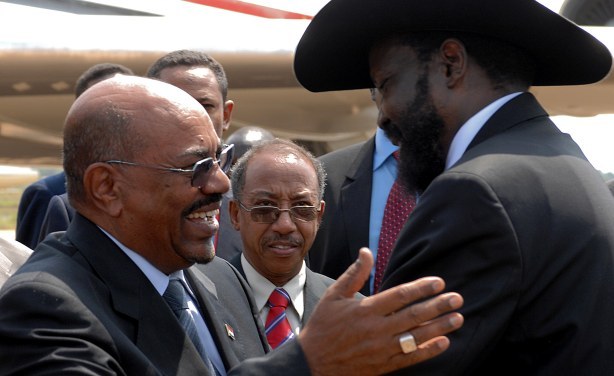Addis Ababa — Sudan's President Omer Hassan Al-Bashir and his Southern counterpart Salva Kiir decided to continue direct talks on security and disputed areas for the third day, after failing to reach an agreement on Monday.
Since Sunday the two presidents flanked by their top negotiators discuss the operationalisation of the buffer zone to allow oil exportations. Sudan gave a conditional acceptance of the mediation's map.
On Abyei, which is the main topic of the summit, the mediation in its proposal supported the South Sudan point of view on the eligibility of voters but asked Juba to accept to share Abyei oil resource with South Kordofan and to endorse a special status for the movement of nomads.
Juba accepted Abyei proposal but Khartoum wants further concessions to soften the eligibility conditions in a way to ensure the participation of a large number of Misseriya who are very hostile to the African map.
There is no sign of progress on reaching a comprehensive agreement on the outstanding issues between the leaders of the two former civil war rivals, a South Sudanese diplomat close to the talks told Sudan Tribune under under the cover of anonymity later on Monday.
The face to face talks between the two leaders will continue tomorrow, and it is highly expected that both sides will strike a deal on the issues remaining from the 2005 peace agreement that ended decades of civil war between North and South Sudan, he added.
The two leaders held three meetings on Monday in an attempt to reach a comprehensive agreement on all post-split pending issues including a safe demilitarized border zone.
The spokesperson of the Sudanese foreign ministry El-Obeid Murawah told reporters in Addis Ababa that some progress has been achieved over the issue of Mile 14. He further said the discussions resume on Tuesday at 10:00 am expressing hopes to reach a comprehensive deal.
But the spokesperson of the south Sudanese delegation, Atif Kiir, told reporters after the last meeting there are still some hurdles preventing the two president from striking a comprehensive deal over the outstanding issues.
Leaks in Addis Ababa, say the two parties reached a compromise over Mile 14 as the South Sudan accepted to pull out its troops from the disputed grazing land. The deal was reached following a meeting attended by the Ethiopian Prime Minister Hailemariam Desalegn and chief mediator Thabo Mbeki in the afternoon.
In Khartoum the speaker of the Sudanese National Assembly, Ibrahim Al-Tahir, reiterated Sudan's rejection to make any concession over Mile 14. He also added that there are some Dinka residing the area but added they can remain Sudanese citizens.
The head of the opposition National Consensus Forces, Farouk Abu Issa blamed the government for excluding the opposition from the ongoing process saying what is going in Addis is a "farce rejected by the opposition and the Sudanese people."
The opposition always demanded to be involved in the discussions over national issues like Abyei and demarcation of borders, but the ruling National Congress Party ignored their demands.
However some tribal leaders loyal to the government were allowed to visits the venue of the talks and to meet the mediation or the Sudanese negotiating team to express their point of view.
MACHAR TO NEW YORK
The South Sudanese Vice President Riek Machar has arrived Monday in New York to represent his country at the meetings of the UN General Assembly, as Salva Kiir failed to leave for New York due to the talks .
His delegation includes foreign minister Nhial Deng Nhial, finance minister Kosti Manibe, justice minister John Luk Jock, presidential advisor Telar Deng and other officials.
Machar will give a speech on Thursday where he is expected to focus on challenges facing the young nation and ongoing process with the Sudan in Addis Ababa.
SPLM-N WANTS TO JOIN SECURITY TALKS
Yasir Arman, secretary general of the rebel Sudan people's Liberation Movement North (SPLM-N) said they want to join the security talks between Sudan and South Sudan.
"It's important to involve the SPLM-North," he told Bloomberg on Monday . The rebel official went further to explain that they controls parts of the border in Southern Kordofan and Blue Nile stressing the need to take this fact in consideration.
The buffer zone if established will cut the Sudanese rebels from South Sudan. The rebels who hold separate talks said they are ready to sign a ceasefire with Khartoum but urged to implement a humanitarian deal reached last August.
via SudanTribune



